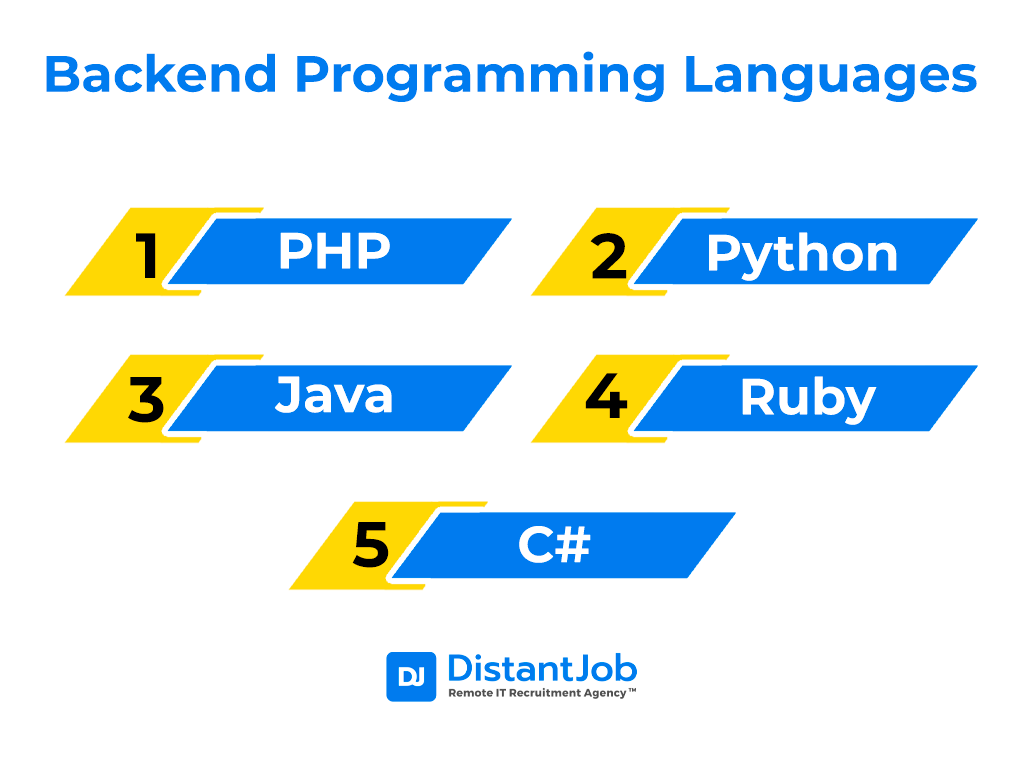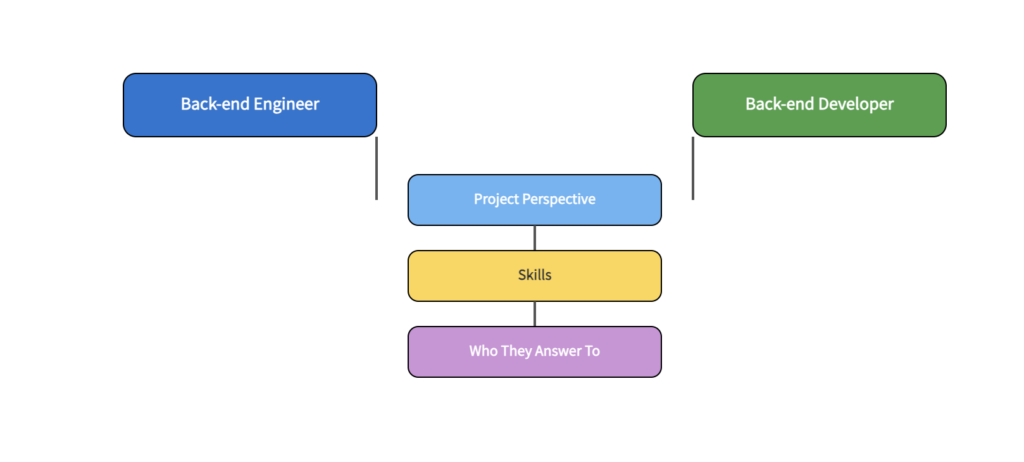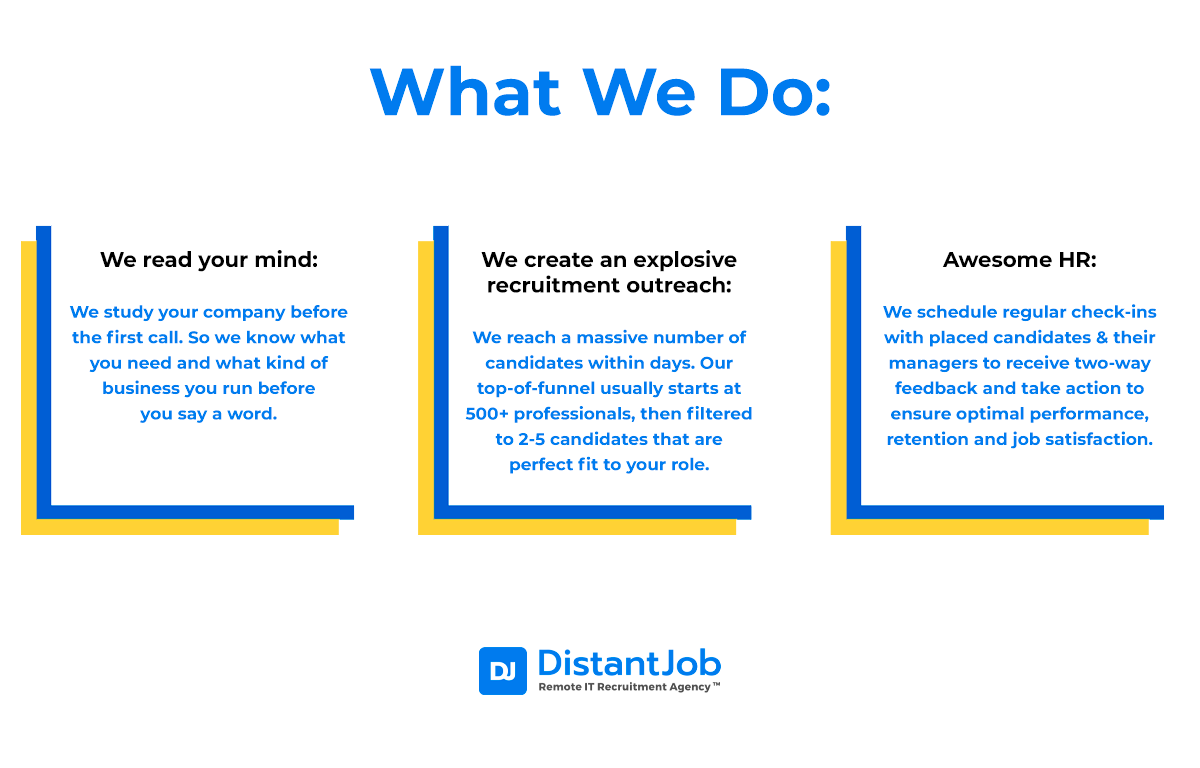While both a backend developer and an engineer work on the server side of software, handling databases, servers, and application logic, their roles and responsibilities are different. A backend engineer is focused on the structure, stability, and performance of a backend system, while the backend developer is responsible for coding the algorithms and features that make it work.
However, for some companies, “developer” and “engineer” are interchangeable terms, and their roles become blurred to the point of no distinction. So, no wonder people often confuse them. In a startup, for example, due to a smaller team, a developer might have backend engineering functions added to their role.
Let’s explore each role, analyzing its main characteristics and the differences between a backend engineer and a developer so that by the end, you’ll know what each entails.
What is a Backend Developer?
A backend developer is responsible for writing the web services and APIs used by front-end developers and mobile app developers. They oversee the server-side web application logic as well as the integration of the front-end part.
A backend developer is like a master builder, implementing all sorts of features. If a master builder builds the wall, the ceiling, the pipelines, and installs the electrical cables, a backend developer implements all backend features through high-quality code.
Besides being in charge of the server-side logic, their primary focus is to define and maintain the central database, ensuring its high performance and responsiveness to requests from the front end.
In short, a backend developer writes and maintains code.
What Does A Back-end Developer Do?
While the back-end engineer has the role of the chef, the back-end developer would be the sous-chef. He/she understands what must be done to create the perfect dish and knows how to execute it. The back-end developer understands the structure built by the backend engineer and focuses on features or tasks to make the development of the software possible.
Backend Developer Skills
- Know a programming language suited for backend like: Python, Go, Ruby, C#, PHP, Rust, or Java.
- Understanding of how the Internet works (DNS, Hosting, Domains, Browsers
- Integration of data sources and databases into a single system, using SQL and NoSQL.
- Versioning with Git.
- User authentication and authorization between multiple systems and servers.
- API integrations and designing
- Caching
- Cybersecurity
- Good practices in CD/CI and Testing
- Write clean and maintainable code.
- Understanding cross-platform functionality and compatibility of applications.
Backend Developer Responsibilities
- Troubleshoot and debug applications.
- Conduct UI tests and optimize performance.
- Participate in the application lifecycle.
- Develop sustainable web applications with clean codes.
- Provide training and support to other team members.
Back-end Developer Salary
How much does a backend developer earn? Here are some average Back-end developer salaries around the world, based on values sourced from Talent.com and Glassdoor:
| Country | Salary per year | Salary per month | Salary per hour |
| USA | $128,368.00 | $10,697.00 | $67.00 |
| Mexico | $27,651.00 | $2,304.00 | $14.00 |
| Argentina | $10,035.00 | $836.00 | $5.00 |
| Brazil | $16,547.00 | $1,379.00 | $9.00 |
| Poland | $31,461.00 | $2,622.0 | $16.00 |
How different is the backend developer vs. software engineer salary? From our research, when comparing a software engineer vs. a backend developer in terms of salary, they will earn comparable values.
What is a Backend Engineer?
A backend engineer is responsible for building and maintaining the server-side of web applications. In other words, a backend engineer’s primary responsibility is to take care of the structure of a software application.
Backend engineers are like real-life engineers: they ensure developers build code that makes sense for the project, making it sustainable. Just as engineers oversee the work of a team of builders.
In smaller companies, they might fill a backend architect role (planning the backend architecture by themselves). However, their role is mainly to keep and maintain the database, the server, and the API governance.
They set the software team’s foundations for achieving the main goals. The primary functions of a backend engineer in a software development team are to write business logic, server scripts, and APIs that will later be used by the other developers and team members.
A backend engineer combines coding with strategy. They make sure the project is safe, sustainable, and scalable by coordinating efforts with the backend developers.
Backend engineering consists of optimizing servers for speed and stability, ensuring the structure is secure, and generating reusable code libraries and data storage solutions.
Backend engineers are also in charge of:
- Optimizing servers for speed and stability.
- Building security structures.
- Generating reusable code libraries.
- Creating data storage solutions.
In short, a backend engineer designs solutions (problem-solving, security, integration, etc.), not just code.
What Does a Back-end Engineer Do?
Backend engineers have the skills necessary to perform their jobs efficiently. As stated above, they are the ones who set the path for the software team.
They oversee the building of a software application’s structure. Backend engineers spend time writing server scripts and APIs that front-end engineers and UX designers will later use.
If we return to our previous example of a kitchen, a back-end developer would be the sous-chef, and the back-end engineer would be the chef.
Backend engineers work on the server components of multi-tier web applications, focusing on web services and data stores. They may also be involved with business rule implementation logic,.
Back-End Engineer Skills
A back-end engineer has the same skills as the back-end developer, plus:
- Microservices vs Monoliths: Understand pros/cons, when to use each
- Service-to-service communication: gRPC, REST, message brokers
- Scalability: horizontal scaling, load balancing, caching strategies
- Reliability and fault tolerance: retries, circuit breakers, fallback mechanisms
- Domain-driven design (DDD) and modular architecture
- Design patterns (Factory, Repository, etc.) and anti-patterns
- Containerization & orchestration: Docker, Kubernetes
- CI/CD pipelines: GitHub Actions, GitLab CI, Jenkins
- Monitoring and Logging: Prometheus, Grafana, ELK stack, Sentry
- Cloud platforms: AWS (especially services like EC2, S3, Lambda, RDS), GCP, Azure
- Infrastructure as Code (IaC): Terraform, Pulumi
- Data encryption (in transit and at rest): TLS, AES
- OWASP Top 10: Common backend vulnerabilities like SQL injection, broken authentication
- Role-based access control (RBAC)
- Audit trails & compliance logging (especially in fintech, healthcare, etc.)
- Performance engineering
- Cross-team communication
- Mentoring & technical leadership

Backend Engineer Responsibilities
Besides the tasks explained above, a backend engineer also has these responsibilities:
- Regularly inspect server code for speed optimization.
- Conceptualize and implement solutions for data storage.
- Improve the quality of the team’s code through writing unit tests and automation.
- Collaborate and work closely with the product and design team to better understand the end-user requirements.
- Configure the backend usability of all front-side applications.
Back-end Engineer Salary
How much does a backend engineer earn ? Here are some average Back-end developer salaries around the world, based on values sourced from Talent.com and Glassdoor:
| Country | Salary per year | Salary per month | Salary per hour |
| USA | $113,622.00 | $9,469.00 | $59.0 |
| Mexico | $24,202.00 | $2,017.00 | $13.00 |
| Argentina | $7,328.00 | $611.00 | $4.00 |
| Brazil | $17,497.00 | $1,458.00 | $9.00 |
| Poland | $27,495.00 | $2,291.0 | $14.00 |
Back-end Engineer vs. Back-end Developer: Main Differences
The difference between a backend engineer and a backend developer is that a backend engineer maintains a working system and plans technical solutions, while a backend developer writes the actual code and builds the features based on those plans.
Here is a side-by-side comparison between back-end developers and engineers:

1. Project Perspective
This is the main factor that distinguishes these two jobs:
Back-end engineers will usually concern themselves with the macro of a project: how it’s structured and designed. They will have an understanding of the project’s overview at all times, but will only understand individual features as much as they contribute to the whole, without going into much detail.
Back-end developers, on the other hand, are more concerned with the micro of a project: they are responsible for creating the many features a project needs to function, and will need to understand and think about them at a deep level to do so.
2. Skills
To complete their respective jobs, engineers and developers need different sets of skills:
Back-end engineers will need strong notions of software design and architecture. They will also need the basics of software development so they can analyze at a glance if their designs are achievable and with which technologies. Back-end developers are the ones actually executing the features of the back-end, so they will need to be highly knowledgeable of technical concepts and their execution. Programming expertise is essential.
Here’s a comparison table to get a better idea:
| Skill Domain | Backend Developer | Backend Engineer |
| Write backend code | ✅ Required | ✅ Required |
| API design | ✅ | ✅ (plus long-term maintainability) |
| Database CRUD operations | ✅ | ✅ (plus optimization, schema design) |
| Systems design | 🟡 Optional | ✅ Core |
| DevOps knowledge | 🟡 Helpful | ✅ Needed |
| Security practices | 🟡 Helpful | ✅ Responsible |
| Scalability planning | ❌ Rare | ✅ Core |
| Monitoring & alerting | 🟡 | ✅ Owns |
| Performance engineering | 🟡 Feature-level | ✅ System-level |
| Cross-team communication | 🟡 Within the dev team | ✅ Cross-functional |
| Mentoring & technical leadership | 🟡 Rare | ✅ Often expected |
3. Who They Answer To
With the industry being in consensus, it is that any distinction between the two roles is fluid. Companies of all sizes crave talent who can do both development and engineering. Therefore, there isn’t a straight answer to who backend engineers and developers answer to. It depends on the company.
Many tech companies (large and small) give engineers and developers a broad responsibility to design, code, and problem-solve. They might choose one title convention (often “Engineer”) and stick with it. In these environments, the two titles mean practically the same thing daily. In that case, both answer to the same Tech Lead, Product Manager, Senior Engineer, or Engineer Manager.
For example, Amazon’s standard title is Software Development Engineer (SDE). It explicitly blends both terms and indicates no real difference between a “developer” and an “engineer” in Amazon’s hierarchy.Agile frameworks, like Scrum or DevOps, promote cross-functional teams without rigid role silos. According to Neil Killick,
“Scrum recognizes no titles for Development Team members other than Developer, regardless of the work being performed”.
In such cases, applying engineering to backend development doesn’t matter; developers are still developers. They work along with the Product Owner and the Scrum Master.
Hierarchy enforces strict roles in more traditional IT companies (older enterprises or heavily regulated industries). In such classical companies, developers tend to be junior, engineers tend to be senior. In these companies, developers answer to engineers and seniors, engineers answer to executives or architects.
For example, a bank’s IT department might label a role Backend Developer – Java for someone coding Java services under direction, but reserve Backend Software Engineer for someone who reviews the system architecture or leads technical projects under a Software Architect.
In short, agile modern teams tend to blur the developer/engineer line. They treat every contributor as an engineer or developer. Traditional teams draw sharper lines, which can make the engineer vs. developer title a proxy for seniority or scope.
Conclusion
Now that you know the differences between back-end developers and engineers, you can now make more informed decisions as to which type you should hire to bolster your team’s ranks.
If you need help headhunting and recruiting remote IT talent, you’ve come to the right place! At DistantJob, we’ve been successfully helping companies hire talented remote tech experts ready to help them achieve their projects and goals for over 15 years.
We have simple and efficient steps to help you hire the best back-end developer candidates for your company and boost your project:

If you need to hire a back-end developer, we can help you find the right candidate. Reach out to us today!
FAQ
When you interact with a website for any reason (say, clicking a button or filling out a form), that information goes to a place called the back-end. The back-end represents the server-side logic that powers websites and applications. It’s the behind-the-scenes part of all the actions we take in a site.
Backend development primarily focuses on databases, scripting, backend logic, APIs, and website architecture. It is everything users can’t see but that powers everything that happens on a website.
Backend development can be executed using two different types of programming paradigms, each with its own set of languages: Object-oriented Programming (OOP) and Functional Programming.
The skills change depending on the job demands as backend development takes care of different aspects and parts. However, apart from the languages mentioned, there are other skills every backend expert needs to have:
* Deep understanding of deploying or hosting.
* Knowledge of version control (Git and GitHub).
* In-depth understanding of accessibility and security compliances.
* Ability to manage a hosting environment along with database administration.
* Understanding of scaling applications to handle the load changes that is a large amount of data traffic.
* Knowledge of front-end technologies (HTML, CSS, and JavaScript)
* In-depth understanding of algorithms and data structures.
Front-end development focuses on programming the visual elements of a website or app that a user will interact with (the user-facing).
Back-end development refers to the side of a website users can‘t usually see (the server-side of a website or application).
While it depends on the type of website or application you want to build, overall, the top 8 languages for backend development are JavaScript (Netflix), Python (Instagram), Ruby (GitHub), C# (Microsoft Visual Studio), PHP (WordPress), Java (Twitter), Perl (BBC), C++ (Photoshop).





